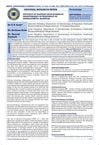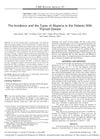 1 citations,
December 2021 in “Medical Records”
1 citations,
December 2021 in “Medical Records” The COVID-19 pandemic led to fewer dermatology visits, older and more male patients, and more stress-related skin issues.
 1 citations,
February 2021 in “Journal of Dermatological Treatment”
1 citations,
February 2021 in “Journal of Dermatological Treatment” Artificial hair implants can quickly improve looks and life quality, but they have risks like infection and early fiber loss, so more research is needed to confirm their safety and effectiveness.
 March 2024 in “Buletin de psihiatrie integrativă (Print)”
March 2024 in “Buletin de psihiatrie integrativă (Print)” Hair loss from telogen effluvium can cause mental health issues and lower life quality, needing both medical and emotional support.
[object Object]  May 2023 in “PARIPEX INDIAN JOURNAL OF RESEARCH”
May 2023 in “PARIPEX INDIAN JOURNAL OF RESEARCH” Platelet-rich plasma is an effective and safe treatment for male pattern hair loss.
 August 2022 in “Revista de la Universidad Industrial de Santander/Salud UIS”
August 2022 in “Revista de la Universidad Industrial de Santander/Salud UIS” Stress-related hair loss was reversed with a special medication.
 August 2020 in “The American Journal of Cosmetic Surgery”
August 2020 in “The American Journal of Cosmetic Surgery” Hair transplant surgery significantly reduces anxiety in balding patients, especially those under 30 years old.
 January 2019 in “ISGE series”
January 2019 in “ISGE series” Estrogen helps prevent artery plaque by stopping monocyte capture in blood vessels.
 January 2017 in “Postepy Dermatologii I Alergologii”
January 2017 in “Postepy Dermatologii I Alergologii” The CRH/CRH-R1 system might be involved in causing lichen planus.
 January 2017 in “Clinical approaches and procedures in cosmetic dermatology”
January 2017 in “Clinical approaches and procedures in cosmetic dermatology” Men are increasingly seeking quick-result cosmetic treatments for their thicker, oilier skin and hair loss issues.
 May 2009 in “Endocrinologist”
May 2009 in “Endocrinologist” Women with thyroid disease are more likely to experience female pattern hair loss, especially if they've had thyroid disease for a long time.
 January 2017 in “Cogent Medicine”
January 2017 in “Cogent Medicine” Extracts improve hair growth in alopecia.
44 citations,
February 2016 in “Zoology” Hair cortisol levels in primates are useful for stress assessment but vary by age, sex, species, and hair collection methods.
6 citations,
July 2018 in “PubMed” The treatment is safe and very effective for hair growth in Asian men with minimal side effects.
2 citations,
April 2008 in “Advances in therapy” Proper diagnosis and treatment of childhood hair loss require distinguishing between alopecia and trichotillomania.
137 citations,
January 2006 in “Frontiers in bioscience” CRH in the skin acts like the body's stress response system, affecting cell behavior and immune activity.
106 citations,
January 2013 in “Clinical and Developmental Immunology” Alopecia areata is caused by immune system attacks on hair follicles, often triggered by viral infections.
61 citations,
September 2010 in “Journal of Dermatological Science” Stress hormones and autoimmune reactions can cause hair loss.
51 citations,
December 2017 in “Skin Appendage Disorders” Stress may trigger hair loss by affecting immune protection in hair follicles.
 31 citations,
May 2020 in “Dermatologic Therapy”
31 citations,
May 2020 in “Dermatologic Therapy” Quarantine stress likely worsened hair loss in women, but video consultations helped manage their condition and reduce anxiety.
18 citations,
June 2010 in “Cell Stress and Chaperones” Heat treatment increases hair loss in certain mice.
 16 citations,
January 2018 in “International Journal of Trichology”
16 citations,
January 2018 in “International Journal of Trichology” Minoxidil may help treat hair loss by reducing inflammation-related gene activity in skin cells.
 12 citations,
April 2020 in “British Journal of Dermatology”
12 citations,
April 2020 in “British Journal of Dermatology” Caffeine may help reduce stress-induced hair loss.
11 citations,
May 2020 in “Frontiers in psychiatry” Child abuse is linked to higher BMI, but not because of hair cortisol or cortisone levels.
8 citations,
January 2019 in “The journal of investigative dermatology/Journal of investigative dermatology” Growth hormone is important for regulating human hair growth.
 4 citations,
November 2021 in “Journal of Cosmetic Dermatology”
4 citations,
November 2021 in “Journal of Cosmetic Dermatology” QR678 and QR678 Neo treatments, combined with corticosteroid injections, work better for alopecia areata than corticosteroid injections alone.
 4 citations,
August 2021 in “Frontiers in Cell and Developmental Biology”
4 citations,
August 2021 in “Frontiers in Cell and Developmental Biology” Stress can cause hair loss by affecting nerve-related hair growth, and noradrenaline might help prevent this.
 2 citations,
October 2022 in “Journal of Biomedical Science”
2 citations,
October 2022 in “Journal of Biomedical Science” Stem cells and their secretions could potentially treat stress-induced hair loss, but more human trials are needed.
1 citations,
December 2022 in “Bioactive Materials” The microneedle patch with quercetin, zinc, and copper effectively promotes hair regrowth for androgenic alopecia.
1 citations,
June 2022 in “Frontiers in Neuroanatomy” Early hormones shape sex-specific differences in rat glands.
[object Object]  1 citations,
January 2020 in “Инфекционные болезни. Новости, мнения, обучение”
1 citations,
January 2020 in “Инфекционные болезни. Новости, мнения, обучение” Lack of vitamin D might cause hair loss due to autoimmune problems, and fixing vitamin D levels could help treat it.


















